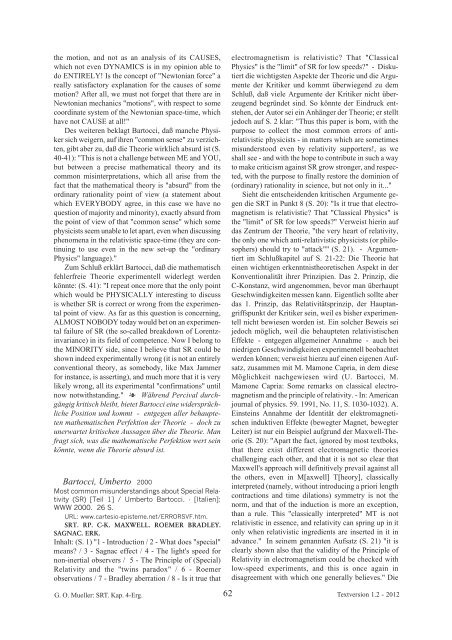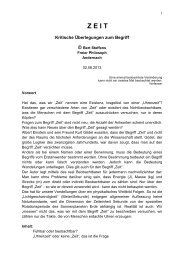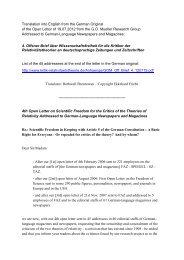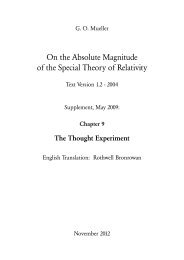2394 weitere kritische Veröffentlichungen - Kritische Stimmen zur ...
2394 weitere kritische Veröffentlichungen - Kritische Stimmen zur ...
2394 weitere kritische Veröffentlichungen - Kritische Stimmen zur ...
Erfolgreiche ePaper selbst erstellen
Machen Sie aus Ihren PDF Publikationen ein blätterbares Flipbook mit unserer einzigartigen Google optimierten e-Paper Software.
the motion, and not as an analysis of its CAUSES,<br />
which not even DYNAMICS is in my opinion able to<br />
do ENTIRELY! Is the concept of "Newtonian force" a<br />
really satisfactory explanation for the causes of some<br />
motion? After all, we must not forget that there are in<br />
Newtonian mechanics "motions", with respect to some<br />
coordinate system of the Newtonian space-time, which<br />
have not CAUSE at all!"<br />
Des <strong>weitere</strong>n beklagt Bartocci, daß manche Physiker<br />
sich weigern, auf ihren "common sense" zu verzichten,<br />
gibt aber zu, daß die Theorie wirklich absurd ist (S.<br />
40-41): "This is not a challenge between ME and YOU,<br />
but between a precise mathematical theory and its<br />
common misinterpretations, which all arise from the<br />
fact that the mathematical theory is "absurd" from the<br />
ordinary rationality point of view (a statement about<br />
which EVERYBODY agree, in this case we have no<br />
question of majority and minority), exactly absurd from<br />
the point of view of that "common sense" which some<br />
physicists seem unable to let apart, even when discussing<br />
phenomena in the relativistic space-time (they are continuing<br />
to use even in the new set-up the "ordinary<br />
Physics" language)."<br />
Zum Schluß erklärt Bartocci, daß die mathematisch<br />
fehlerfreie Theorie experimentell widerlegt werden<br />
könnte: (S. 41): "I repeat once more that the only point<br />
which would be PHYSICALLY interesting to discuss<br />
is whether SR is correct or wrong from the experimental<br />
point of view. As far as this question is concerning,<br />
ALMOST NOBODY today would bet on an experimental<br />
failure of SR (the so-called breakdown of Lorentzinvariance)<br />
in its field of competence. Now I belong to<br />
the MINORITY side, since I believe that SR could be<br />
shown indeed experimentally wrong (it is not an entirely<br />
conventional theory, as somebody, like Max Jammer<br />
for instance, is asserting), and much more that it is very<br />
likely wrong, all its experimental "confirmations" until<br />
now notwithstanding." � Während Percival durchgängig<br />
kritisch bleibt, bietet Bartocci eine widersprüchliche<br />
Position und kommt - entgegen aller behaupteten<br />
mathematischen Perfektion der Theorie - doch zu<br />
unerwartet <strong>kritische</strong>n Aussagen über die Theorie. Man<br />
fragt sich, was die mathematische Perfektion wert sein<br />
könnte, wenn die Theorie absurd ist.<br />
Bartocci, Umberto 2000<br />
Most common misunderstandings about Special Relativity<br />
(SR) [Teil 1] / Umberto Bartocci. - [Italien]:<br />
WWW 2000. 26 S.<br />
URL: www.cartesio-episteme.net/ERRORSVF.htm.<br />
SRT. RP. C-K. MAXWELL. ROEMER BRADLEY.<br />
SAGNAC. ERK.<br />
Inhalt: (S. 1) "1 - Introduction / 2 - What does "special"<br />
means? / 3 - Sagnac effect / 4 - The light's speed for<br />
non-inertial observers / 5 - The Principle of (Special)<br />
Relativity and the "twins paradox" / 6 - Roemer<br />
observations / 7 - Bradley aberration / 8 - Is it true that<br />
G. O. Mueller: SRT. Kap. 4-Erg.<br />
62<br />
electromagnetism is relativistic? That "Classical<br />
Physics" is the "limit" of SR for low speeds?" - Diskutiert<br />
die wichtigsten Aspekte der Theorie und die Argumente<br />
der Kritiker und kommt überwiegend zu dem<br />
Schluß, daß viele Argumente der Kritiker nicht überzeugend<br />
begründet sind. So könnte der Eindruck entstehen,<br />
der Autor sei ein Anhänger der Theorie; er stellt<br />
jedoch auf S. 2 klar: "Thus this paper is born, with the<br />
purpose to collect the most common errors of antirelativistic<br />
physicists - in matters which are sometimes<br />
misunderstood even by relativity supporters!, as we<br />
shall see - and with the hope to contribute in such a way<br />
to make criticism against SR grow stronger, and respected,<br />
with the purpose to finally restore the dominion of<br />
(ordinary) rationality in science, but not only in it..."<br />
Sieht die entscheidenden <strong>kritische</strong>n Argumente gegen<br />
die SRT in Punkt 8 (S. 20): "Is it true that electromagnetism<br />
is relativistic? That "Classical Physics" is<br />
the "limit" of SR for low speeds?" Verweist hierin auf<br />
das Zentrum der Theorie, "the very heart of relativity,<br />
the only one which anti-relativistic physicists (or philosophers)<br />
should try to "attack"" (S. 21). - Argumentiert<br />
im Schlußkapitel auf S. 21-22: Die Theorie hat<br />
einen wichtigen erkenntnistheoretischen Aspekt in der<br />
Konventionalität ihrer Prinzipien. Das 2. Prinzip, die<br />
C-Konstanz, wird angenommen, bevor man überhaupt<br />
Geschwindigkeiten messen kann. Eigentlich sollte aber<br />
das 1. Prinzip, das Relativitätsprinzip, der Hauptangriffspunkt<br />
der Kritiker sein, weil es bisher experimentell<br />
nicht bewiesen worden ist. Ein solcher Beweis sei<br />
jedoch möglich, weil die behaupteten relativistischen<br />
Effekte - entgegen allgemeiner Annahme - auch bei<br />
niedrigen Geschwindigkeiten experimentell beobachtet<br />
werden können; verweist hierzu auf einen eigenen Aufsatz,<br />
zusammen mit M. Mamone Capria, in dem diese<br />
Möglichkeit nachgewiesen wird (U. Bartocci, M.<br />
Mamone Capria: Some remarks on classical electromagnetism<br />
and the principle of relativity. - In: American<br />
journal of physics. 59. 1991, No. 11, S. 1030-1032). A.<br />
Einsteins Annahme der Identität der elektromagnetischen<br />
induktiven Effekte (bewegter Magnet, bewegter<br />
Leiter) ist nur ein Beispiel aufgrund der Maxwell-Theorie<br />
(S. 20): "Apart the fact, ignored by most textboks,<br />
that there exist different electromagnetic theories<br />
challenging each other, and that it is not so clear that<br />
Maxwell's approach will definitively prevail against all<br />
the others, even in M[axwell] T[heory], classically<br />
interpreted (namely, without introducing a priori length<br />
contractions and time dilations) symmetry is not the<br />
norm, and that of the induction is more an exception,<br />
than a rule. This "classically interpreted" MT is not<br />
relativistic in essence, and relativity can spring up in it<br />
only when relativistic ingredients are inserted in it in<br />
advance." In seinem genannten Aufsatz (S. 21) "it is<br />
clearly shown also that the validity of the Principle of<br />
Relativity in electromagnetism could be checked with<br />
low-speed experiments, and this is once again in<br />
disagreement with which one generally believes." Die<br />
Textversion 1.2 - 2012





